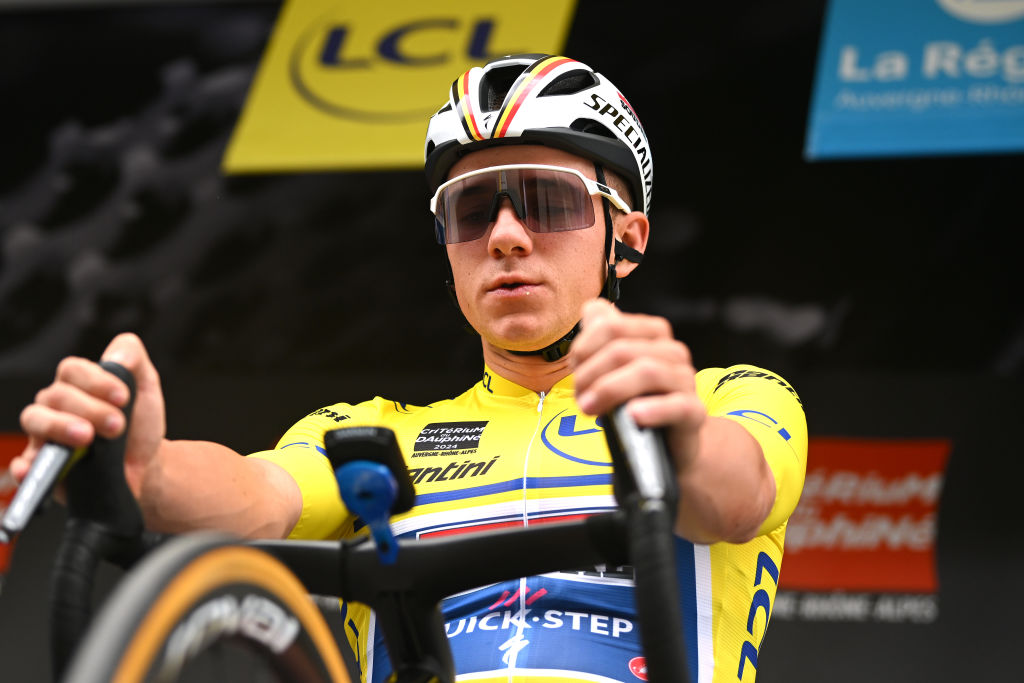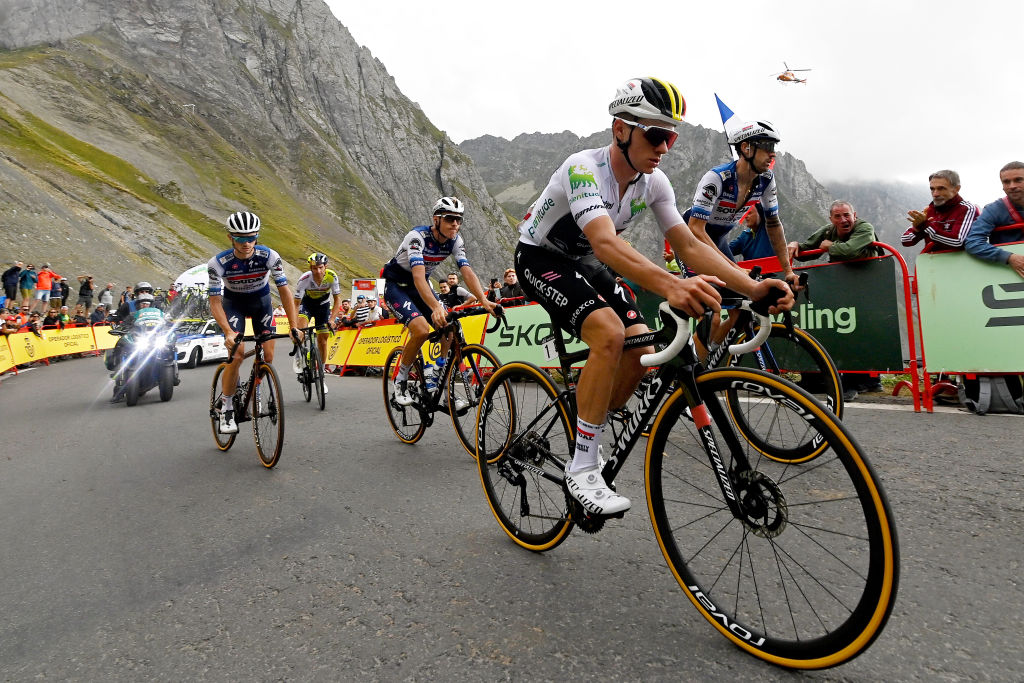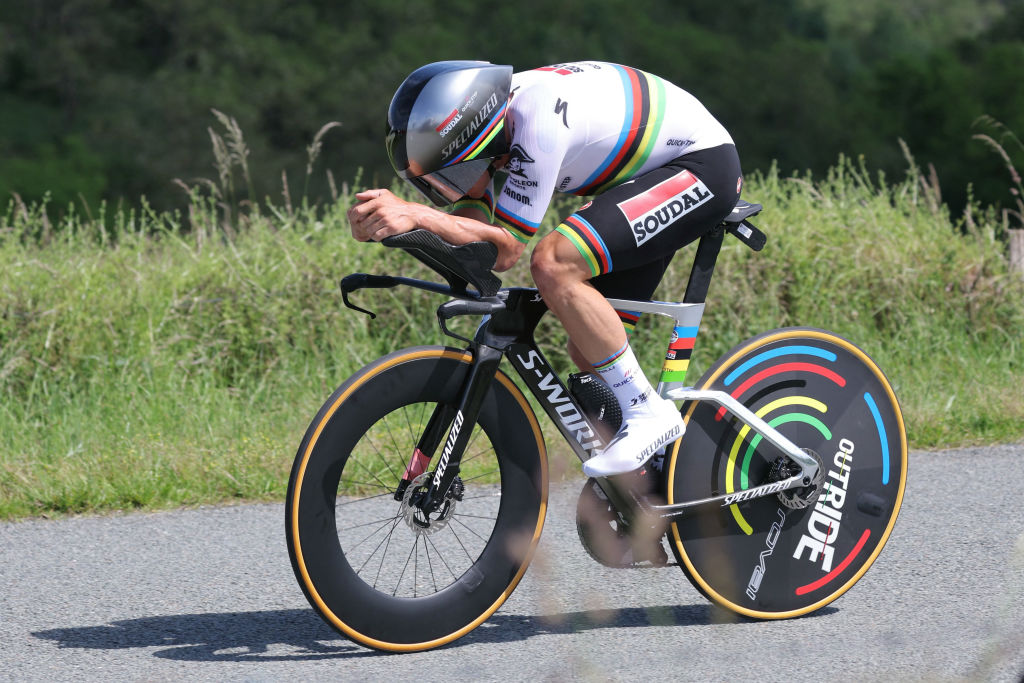
There hasn’t been a Tour de France debut as anticipated as this one since at least 2008, when the cover of Vélo Magazine’s preview edition was devoted to neophyte Andy Schleck. Before that, you’d probably have to go all the way back to a young Greg LeMond’s maiden Tour in 1984.
Remco Evenepoel has done just about everything in a hurry since he bounded directly from the junior ranks to the WorldTour, but the Soudal-QuickStep racer has been markedly patient about entering the fray at the biggest race of them all, waiting until his fifth professional season to take on the Tour.
That’s partly down to circumstance. Evenepoel might well have made it to the Tour sooner had his planned Giro d’Italia debut not been interrupted by his dramatic crash at Il Lombardia in 2020. Then again, when COVID-19 forced Evenepoel out of last year’s Giro, he ruled out the idea of quickly recalibrating and taking aim at the Tour instead. He would only go when he was ready, not before.
Evenepoel’s no-holds-barred displays as a junior and a neo-pro suggested that his was an impulsive talent, but those close to him insist that he has always been methodical in his approach. He selects his targets very carefully. “He likes a project,” one member of his entourage explained in the summer of 2022, when Evenepoel dismissed any talk of a late Tour call-up in favour of sticking to his original plan of racing – and winning – that year’s Vuelta a España.
“It’s three months of all-in and that’s what I really like about it,” Evenepoel said last year when asked about the loneliness of preparing for a Grand Tour.
For 2024, of course, the “project” has been the Tour. His entire season has been built around being at his best in France in the summer, both for La Grande Boucle itself and for the Paris Olympics immediately afterwards. When Evenepoel threw his hat into the ring over the winter, he set himself the official target of placing in the top five overall in Nice, but that didn’t stop him from being immediately placed among the top tier of contenders for the Tour, alongside Tadej Pogačar (UAE Team Emirates), Jonas Vingegaard (Visma-Lease A Bike) and Primož Roglič (Bora-Hansgrohe).
Even so, Evenepoel’s credentials for three-week racing divide opinion. In the performatively polarised manner of such debates these days, Evenepoel has tended either to be hailed as the second coming of Eddy Merckx or dismissed as some manner of dilettante for not winning every Grand Tour he’s started. “He’ll never be a great stage race rider,” sniffed Claudio Chiappucci (zero Grand Tour wins) last winter of a man who has already won twelve stage races as a pro, including the Vuelta.
The reality, as ever, is more nuanced, and Movistar manager Eusebio Unzué hit upon the nub of the matter when he was asked about Evenepoel’s Tour prospects earlier this year. “Remco can win the Tour, but only if he rides like Remco for 21 days out of 21,” he said. “If he only rides like Remco for 20 days out of 21, then it’ll be difficult.”
Unzué was speaking with last year’s Vuelta in mind, when Evenepoel carried the fight to Jumbo for almost two weeks before collapsing and losing almost half an hour on stage 13 to the Col du Tourmalet. 24 hours later, Evenepoel bounced back to claim a soaring win at Larra-Belagua, and he would attack relentlessly throughout the final week of the race, adding another stage victory and the mountains classification.
At his best, like at the Wollongong Worlds or in his back-to-back Liège-Bastogne-Liège victories, Evenepoel produces displays to stack up against Pogačar’s back catalogue. For his next trick, however, he will be asked to replicate that across three weeks and in the high mountains.
For some, Evenepoel’s ruinous jour sans at the Vuelta was more proof that he couldn’t possibly hope to cope with Pogačar and Vingegaard in the white heat of July, either in 2024 or beyond. For others, his response to the Tourmalet setback was a firm indication of what he might eventually achieve in this sport. It was all in the eye of the beholder, in other words.
And that’s what makes Evenepoel arguably the most compelling of the so-called ‘Big Four.’ By now, we all have a fair idea of what Pogačar, Vingegaard and Roglič can and cannot do. Evenepoel, on the other hand, remains a work in progress. It’s hard to shake off the sense that he still has margin for improvement, but it’s anybody’s guess as to how far that will carry him against Pogačar et al.

Crash
Evenepoel’s path to this Tour was complicated by the mass crash at Itzulia Basque Country on April 4, when he, Vingegaard and Roglič were among the many fallers. Vingegaard was the worst affected, spending almost two weeks in hospital and only confirming his Tour participation last week, but Evenepoel’s injuries are not to be underestimated. The fractured collarbone and shoulder blade he suffered in the crash ruled him out of the Ardennes Classics, and they surely also had a knock-on effect on his Tour preparation.
Although Evenepoel was able to train in Sierra Nevada as planned in May – his first altitude camp of the year – he was somewhat short of his best when he returned to competition at the Critérium du Dauphiné earlier this month. His ability against the watch carried him to victory and the yellow jersey in the Neulise time trial, but he suffered once the race hit the mountains in the final three days, losing the lead at Le Collet d'Allevard and eventually slipping to seventh overall.
Given Pogačar’s feats of strength at the Giro d’Italia and the level reached by Vingegaard in the past two Julys, it would have been tempting to dismiss Evenepoel’s Tour hopes there and then, but there was mitigation. For one thing, Evenepoel was still a little shy of his optimum race weight, something Soudal-QuickStep planned he would rectify in the three weeks before the Tour, the first two of which were spent training at altitude at Isola 2000.
“You immediately see it in his face,” manager Patrick Lefevere told Het Nieuwsblad over the weekend, when he casually revealed another extenuating factor in Evenepoel’s Dauphiné display.
“Remco did not feel 100% physically in the Dauphiné,” Lefevere explained. “He had a sore throat, to such an extent that we feared a Giro scenario [a COVID-19 infection – ed.] He also looked drawn after that first mountain stage, a bit like after the time trial in the Giro. He was tested often, but fortunately he was always negative.”
Ill or not, Evenepoel could draw some positives from how he managed himself on the Dauphiné’s three successive mountain stages once it became clear he could not compete with the best. As Philippa York pointed out in her post-Dauphiné analysis on this site, Evenepoel essentially used the summit finishes as a series of tests, pacing himself cautiously on the lower slopes before gradually ramping up the intensity each day in the closing kilometres.
When Evenepoel first turned professional, he seemed to struggle with the concept of losing, his irritation all too evident whenever things did go as planned on the road. Maybe it was hardly surprising, given that he had won so early and so often from the moment he took up the sport as a 17-year-old.
His 2022 campaign seemed to mark a turning point. Evenepoel endured a series of defeats in stage races that spring, but he seemed to respond with increasing serenity to each setback, realising that even a misstep was still a step towards his season’s ultimate goal at the Vuelta. “He had to learn how to manage a race, and he also had to learn how to lose,” Lefevere explained later.
Evenepoel's measured Dauphiné display, not to mention his frank but upbeat analysis during his daily media duties, suggested that he has by now fully absorbed the lesson.

Test
It remains to be seen what Evenpoel can achieve at the 2024 Tour, where his supporting cast in the mountains will be composed of Ilan Van Wilder, Louis Vervaeke and, above all, new arrival Mikel Landa. Logic says that even at his best, Evenepoel will surely not be able to overcome Pogačar and Vingegaard, but this is a curious sort of a Tour, where there is a question mark of sorts over everybody’s chances.
The questions over Pogačar are admittedly faint, given that he was imperious at the Giro, winning with disarming ease. Backed by an imposing team, he is the clear favourite here – but, even so, nobody has won the double since Marco Pantani in 1998. Vingegaard has won the last two Tours, soundly beating Pogačar on each occasion, but he punctured a lung and fractured his collarbone in April, and his true condition is unclear. Roglič won the Dauphiné, but he struggled on the final day; like Evenepoel, he clearly still had work to do before the Tour.
The official line from Soudal-QuickStep hasn’t changed since the winter, and Lefevere trotted it out again for Het Nieuwsblad at the weekend. Almost half a century has passed since Belgium last won the Tour and Evenepoel might one day end that drought, but Lefevere has repeatedly downplayed the notion that the day might come in 2024. “We think top five is a great ambition,” he said again on Saturday, insisting that nobody within the team had even discussed the prospect of winning the race.
The 2024 Tour route does, however, potentially give Evenepoel a shot at wearing the yellow jersey in the opening week – provided, of course, that he stays within touching distance of Pogačar after the tough opening weekend in Italy and the ascent of the Col du Galibier on stage 4.
Evenepoel missed the Belgian championships at the weekend, ostensibly due to a mild illness, but that didn’t stop him from reconnoitring the route of the Tour’s stage 7 time trial to Gevrey-Chambertin on Friday morning. That 25km test is likely to set the tone for the remainder of his race. Victory there would place him firmly in the hunt for a podium finish, but Nice will feel a long, long way away in the event of a setback.
In any case, Evenepoel should be better equipped to cope with the slings and arrows of Grand Tour racing than he was during his first attempt on the 2021 Giro, which doubled as his return to competition after breaking his pelvis the previous summer. After scrapping for bonus seconds with Egan Bernal across the first week, Evenepoel seemed to have convinced himself that he could even challenge for victory, only for his race to unravel as it reached its midpoint.
He cut an altogether calmer figure by the time of his second, successful tilt at the genre on the 2022 Vuelta. In 2023, at both his COVID-interrupted Giro and a Vuelta defence of oscillating emotions, he added to his treasury of Grand Tour experience. The Tour, of course, will be an altogether different challenge due to the depth of the field, but Evenepoel seems uniquely prepared for the other attendant pressures of the race.
The media presence at the Tour dwarfs every other event on the calendar, but Evenepoel has been followed by a dedicated retinue of Belgian journalists since his very first pro race in San Juan in 2019. A man who has already been compelled to do his growing up in public like this is unlikely to be unduly fazed by finding himself in the limelight at the Tour. It’s doubtful that Evenepoel has ever finished a bike race without being asked for an interview about it afterwards, and few riders in the peloton are as assured in front of a microphone as the Belgian.
Even so, it’s striking that Soudal-QuickStep have gone to additional lengths to shield Evenepoel from the glare in the build-up to the Tour, reducing his media availability to the most meagre rations, while access to his teammates - and even to his directeurs sportifs - has also been severely restricted ahead of the Grand Départ. The talking, it seems, will be done once the race hits the road from Florence.
Like each of the four Grand Tours Evenepoel has ridden to date, his Tour debut will inevitably be viewed in some quarters as a definitive referendum on his true prospects of winning the yellow jersey in the years to come. Lefevere, however, preferred to take a longer-term view, pointing to the lessons that would inevitably be learned on the road from Florence to the final time trial in Nice. “We know that there will be more Tours in the future,” he said.
However it plays out, the first Tour will be worth watching closely.
Get unlimited access to all of our coverage of the Tour de France - including journalists reporting, breaking news and analysis on the ground from every stage of the race as it happens and more. Find out more.







